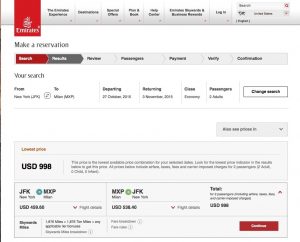Rarely mentioned in the debate about whether the consolidation of the U.S. airline industry is a good or bad thing are news items like this: "Boeing Takes $100 Billion In Orders From Gulf Airlines." Now in case you've never been to the UAE or Qatar, these are very small countries. Dubai, for example, is home to just over 2 million souls, about the same as Houston.
If you bother to read the article (yet another 342 planes, most of them jumbos, from Boeing, and 142 from Airbus at this year's Dubai Air Show), you can probably figure out that Emirates, Qatar, FlyDubai and Etihad are not buying these planes to service their own tiny populations. They are buying them to fly you (assuming that "you" are a European, Asian or North American who travels internationally to anywhere on the planet via the Middle East). And if you're flying not in the cheap seats but in those lucrative business or first class cabins (the fares that actually pay, along with freight, the freight), then all the better.
Why might the consolidation of the U.S. airline industry have been inevitable? The Middle East carriers are aiming to do all this at the expense of not just relatively-healthy Singapore and Lufthansa, but that of our own U.S. carriers, which, despite being in a stronger position post-consolidation, are still-struggling and under-capitalized after years of ruinous price wars, poor management, wage cuts, surly service, old planes, unreliable service, and other woes.
Yes, the Arabs are coming. Those planes will have to be deployed somewhere, right? How about in the USA? As this Bloomberg News article explains, the Middle East is aptly named. It's in the middle of just about everywhere with a one-stop connection. And these airlines have considerable (some would say unfair) backing from their governments (U.A.E.-based Etihad was established by royal decree, no less), which is one reason why the U.S.-based airline pilots association ALPA is lobbying against Abu Dhabi airport receiving permission to offer U.S. Customs pre-clearance (it would give an unfair service advantage to Etihad, since no U.S.-based airline flies from Abu Dhabi to the U.S.).
But you can be sure Middle East carriers soon will be flying more of those shiny new planes to the U.S. They're already expanding (Qatar to Philly, Emirates to Boston, Etihad to LA to name a few); but that's just the wing tip of the 777. And what if we don't let them in? "Countries should really open up to other [read: Middle Eastern] airlines,” Emirates Chairman and Chief Executive Officer Sheikh Ahmed bin Saeed Al Maktoum said in a recent interview. “If they don’t allow us in, they can take their airplanes back.”
Maybe he was just kidding. Where else is he going to go shopping, China? Oh, right.
Image via Emirates






